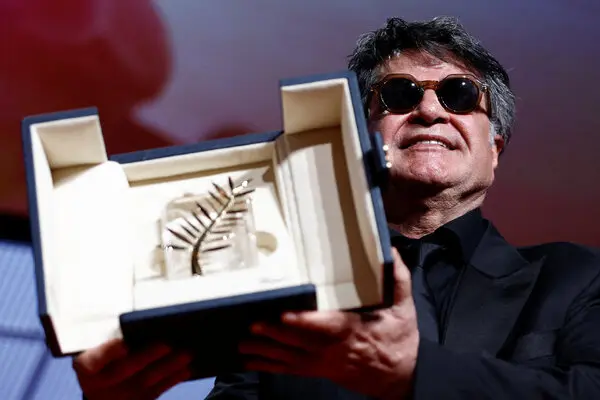CANNES, France — The 78th Cannes Film Festival concluded Saturday with a powerful statement, awarding the coveted Palme d’Or to Iranian director Jafar Panahi for his gripping political thriller It Was Just an Accident, a searing indictment of oppression and corruption in his home country.

Panahi, known for his defiant resistance to state censorship, made a triumphant return to Cannes in person after a 22-year absence marked by imprisonment and travel bans imposed by Iranian authorities. The victory marks a significant moment for a filmmaker once forced to smuggle his films abroad—famously on a USB stick baked into a cake.
The film, inspired by Panahi’s own time in prison, follows a group of former inmates who unexpectedly encounter their jail tormentor and contemplate revenge. Panahi’s tense, deeply personal narrative resonated with critics and jurors alike, securing the festival’s top honor.
“Let’s set aside all problems, all differences,” Panahi urged during his acceptance speech. “What matters most right now is our country—and the freedom of our country.”
A Disrupted Finale: Arson and Outage
The Cannes finale unfolded amid chaos, as a suspected arson attack triggered a major power outage that disrupted screenings and plunged a stretch of the French Riviera into darkness. Traffic lights failed, and businesses emptied into the streets, creating scenes of confusion and cinematic irony.
“It’s the beginning of the end,” quipped one salon customer, her curlers still in place, as generators whirred to life in the Palais des Festivals, allowing the closing ceremony to proceed as planned.
Award Highlights from Cannes 2025
Joachim Trier took the Grand Prix, the festival’s second-highest honor, for Sentimental Value, a subtle, emotional portrait of a fractured Norwegian family, starring Renate Reinsve and Elle Fanning. The film garnered widespread critical acclaim.
A rare joint Jury Prize was awarded to two standout films:
- Sirat by Oliver Laxe, a pulsating road movie that journeys into Morocco’s desert rave culture, and
- Sound of Falling by Mascha Schilinski, a multigenerational saga about four girls raised on a rural German farm.
Kleber Mendonça Filho won Best Director for The Secret Agent, a sharply stylized thriller set in the repressive political landscape of 1970s Brazil. The film’s lead, Wagner Moura, earned Best Actor, while Nadia Melliti claimed Best Actress for her vulnerable portrayal of a French-Algerian teenager confronting cultural identity and sexuality in Hafsia Herzi’s The Little Sister.
Belgium’s legendary Dardenne brothers, Jean-Pierre and Luc, secured Best Screenplay for Young Mothers, a deeply affecting depiction of teenage girls grappling with addiction, adoption pressures, and postpartum depression in a shelter. It marked their 10th competition entry, coming 26 years after their first Palme d’Or win.
Meanwhile, the Camera d’Or for best debut feature went to Hasan Hadi for The President’s Cake, a darkly satirical tale set in Saddam Hussein’s Iraq. Hadi’s film, screened in the Directors’ Fortnight, was lauded by Deadline as “head and shoulders above” many Palme contenders and seen as a potential Oscar nominee for Iraq.
Political Undercurrents and Industry Reckonings
Beyond the awards, off-screen politics dominated much of the Cannes discourse. The ongoing Israeli bombardment of Gaza cast a long shadow, referenced repeatedly in speeches and tributes. The festival opened with a powerful homage to Fatma Hassona, a 25-year-old Palestinian photojournalist killed in an Israeli airstrike, featured in the documentary Put Your Soul on Your Hand and Walk.
Hollywood icon Robert De Niro electrified opening night with a pointed rebuke of President Donald Trump, criticizing the administration’s proposed tariffs on foreign films and calling on filmmakers to defend democracy.
“We cannot be silent in the face of philistinism,” De Niro said as he accepted a career Palme d’Or.
The festival also confronted the film industry’s reckoning with sexual abuse, as French actor Gérard Depardieu was convicted of groping two women and given a suspended sentence on the very day the festival began. Organizers took a bold stance, barring a separate French actor accused of rape from the red carpet—a move widely seen as a long-overdue shift from Cannes’ past hesitance on #MeToo issues.
A controversial new rule banning red-carpet nudity sparked backlash, with critics accusing the festival of policing women’s attire instead of addressing deeper systemic problems.
Cannes 2025: Cinema, Politics, and Power
In a year shaped by power failures both literal and metaphorical, the Cannes Film Festival closed by reaffirming its commitment to bold political storytelling and global cinema. With It Was Just an Accident, Jafar Panahi’s return signaled not only a personal victory but also a cinematic act of defiance that encapsulated the spirit of a turbulent but vital edition of the world’s most prestigious film gathering.



